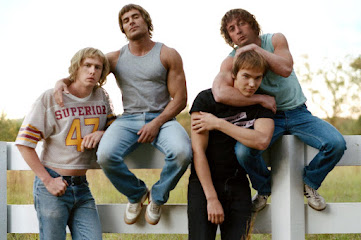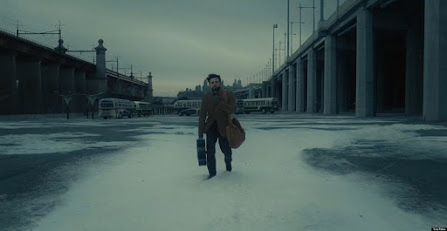Thoughts on The Iron Claw
“I don’t know if that’s true, but I’ve been told. It’s real sweet to grow old.” - John Darnielle
As of writing this, it is December 26th, one day after Christmas, just in case you didn’t know, which makes it three days after watching Sean Durkin’s The Iron Claw. Since then, my thoughts and dreams have been marred with the tragedies of the Von Erich brothers.
You may have noticed, my dear readers, that I have not written much this year. I had a very busy year! I got married, and my wife and I welcomed our son at the end of this year. It feels very trite to say that becoming a father and husband changed my view on art and the way I consume it, but it is what it is. I’ve mostly felt this change when it comes to consuming anything in the “True Crime” genre. I’ve never liked it and always found it to give a greasy hair feeling, and I never liked the feeling of knowing way too much about the end of someone's life rather than the contents of it. Now I find it generally sort of sickening. I’m bringing this up because I think there’s a version of The Iron Claw that plays like a two-hour long episode of Serial or some other podcast that breaks up grizzly retellings with an ad about mattresses or some green drink.
Every day, we should be thanking Sean Durkin for not getting anywhere close to something like that.
I could spend a long time gushing about almost every aspect of this movie, but I’d like to focus on the performances and some general direction. I will be discussing the last half of this movie mostly, so spoilers ahead.
The first third of The Iron Claw flies straight from the top turnbuckle. It’s quick and exciting and the acting chops displayed by all four of the brothers is electric. The way they can find solace and warmth in each other that is clearly missing from their father is a beautiful thing to see and makes the back half of the film all that more crushing. Harris Dickinson, in particular, is outstanding. The way he stands back and attempts to let Kevin, wonderfully played by Zac Efron, have his moment in his father’s sunshine is subtle and sweet in the ways we should be appreciating from actors more. It makes his devastating departure from the film even harder. The filmmaking itself feels elevated when he’s on screen. Durkin knows how exciting his presence is on screen, and when he’s gone for more than half the movie, we feel that same void that his brothers do.
I find the artifice of this movie one of the more interesting parts of the piece. We’re watching actors playing real people who are acting as heightened versions of themselves in a dramatized re-telling of things that have actually happened. Much like melodrama, by raising the fiction to such a boiling point, it allows some kind of emotional truth to come out the other end that much stronger. This might sound obvious of course, but there is great care and consideration to what is being shown and told to us about the Von Erich’s story. Take for example that there was another brother that is not shown in the movie. They omitted Chris Von Erich as the thought of another brother dying prematurely is just too much for an audience member. I agree with this entirely. Even near the end, when Jeremey Allen White’s character Kerry commits suicide you begin to think that there is just no way this happened to a real family and that these events are something that can happen.
That very thought and extreme gut wrench is exactly why we make movies. It’s why we capture such specific facial gestures and feelings through a camera. To find some truth through the fiction of film is the greatest offering a filmmaker can bring. Even if it’s a truth that you can’t wrap your mind around, there’s a probable chance your heart can.
Maybe it’s because I’m a little older and a little more jaded when it comes to art nowadays, but very few times do I leave a theater with a fresh view on this art form. Leaving The Iron Claw, I remembered why I love this stuff so much. Capturing specificity and beaming it out to millions of people and making them feel like they’re not alone in their feelings. Their feelings of fear, anger, and loss are universal even with fictional characters. Durkin accomplishes the impossible and manages to end things in such a beautifully sweet and succinct way. I won’t describe it because the impact is just that good, and my words in this little word document just wouldn’t cut it.
The Iron Claw is undoubtedly my favorite movie of the year and on the shortlist of my much too early best of this decade list. Up next is my top five or maybe top ten of the year. Thanks for reading.


Comments
Post a Comment